Introduction
In an era where digital communication reigns supreme, the healthcare sector confronts a significant challenge: enhancing patient interaction while safeguarding sensitive information. The emergence of HIPAA compliant chatbots offers a remarkable opportunity for financial institutions to streamline operations and elevate customer service without sacrificing privacy. Yet, as organizations adopt this innovative technology, they must address critical questions surrounding compliance, data security, and the complexities of implementing these advanced solutions.
What essential features must a HIPAA compliant chatbot possess to navigate these challenges effectively?
Intone: 24/7 AI Voice Agents for HIPAA Compliant Customer Support
Intone's AI voice agents operate around the clock, ensuring that customer inquiries regarding sensitive health information - like appointment management and basic support - are handled promptly and securely. These agents function as a HIPAA compliant chatbot, ensuring compliance with HIPAA regulations while providing a seamless experience for both individuals and healthcare providers.
By automating Tier-1 support, Intone enhances communication within the medical field, enabling organizations to maintain high service standards while safeguarding sensitive information. The implementation of 24/7 AI voice agents not only boosts operational efficiency but also significantly cuts down wait times. Some medical facilities have reported average response times of under 30 seconds, a remarkable achievement in today's fast-paced environment.
This capability is crucial, especially considering that 64% of individuals are willing to use AI tools for health-related inquiries, provided their information remains secure. As healthcare professionals increasingly acknowledge the transformative potential of AI, the demand for a HIPAA compliant chatbot as a reliable and compliant solution continues to rise. Intone's offerings are thus essential for modern healthcare operations, meeting the growing need for efficiency and security in patient interactions.
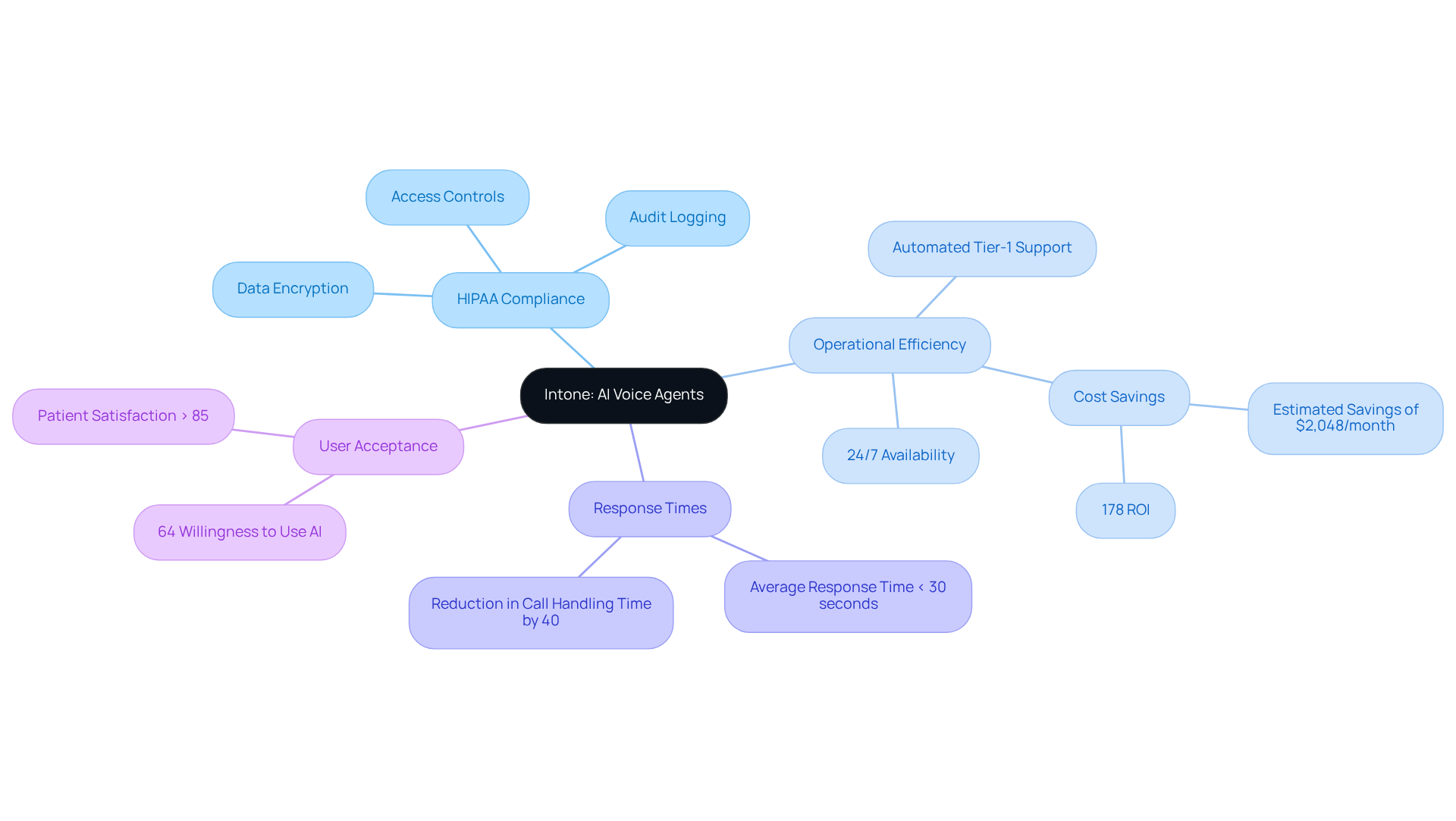
End-to-End Encryption: Safeguarding Patient Data in Chatbot Interactions
End-to-end encryption is essential for ensuring that all information exchanged between individuals and chatbots is securely encoded, both during transmission and while stored. This robust security measure guarantees that even if information is intercepted, it remains unreadable to unauthorized parties, thereby protecting sensitive details.
The implementation of a HIPAA compliant chatbot that utilizes end-to-end encryption is not just a technical necessity; it is a fundamental requirement for maintaining HIPAA compliance and safeguarding individual privacy. Cybersecurity specialists emphasize that the integrity of personal information hinges on such protective measures, especially as digital interactions become increasingly common.
Organizations that prioritize end-to-end encryption not only bolster their security posture but also cultivate trust with their patients. This ensures that sensitive information is handled with the utmost care and confidentiality. Notably, 97% of information protection officers utilize end-to-end encryption as their primary strategy for safeguarding data, underscoring its critical role in today’s cybersecurity landscape.
Moreover, compliance frameworks like HITECH significantly influence encryption strategies. It is imperative for organizations to adopt strong encryption practices to mitigate risks associated with insider threats, which 87% of information protection officers identify as the greatest risk for information leakage. By embracing these measures, organizations can effectively protect sensitive information and utilize a HIPAA compliant chatbot to maintain compliance.

Business Associate Agreements (BAAs): Ensuring Compliance in Chatbot Solutions
A Business Associate Agreement (BAA) is an essential legal contract that outlines the responsibilities of chatbot providers in managing Protected Health Information (PHI). This agreement is vital for ensuring that both parties are aligned on information protection measures and compliance with HIPAA regulations. Establishing a BAA with chatbot providers is crucial for organizations aiming to mitigate risks associated with breaches while utilizing a HIPAA compliant chatbot to maintain the integrity of sensitive health information.
In healthcare technology partnerships, BAAs typically specify the obligations of vendors regarding the safeguarding of PHI. These obligations include:
- Requirements for encryption
- Access controls
- Breach notification protocols
Legal experts emphasize that a well-structured BAA not only defines the responsibilities of each party but also fosters accountability, which is critical in the event of a breach.
Moreover, BAAs must encompass provisions that address the handling of PHI, ensuring that chatbot providers implement necessary safeguards to protect individual data. This includes stipulations for:
- Regular audits
- Compliance checks to uphold health information privacy standards
Additionally, BAAs should clearly outline access to PHI by individuals, enabling organizations to effectively manage rights under HIPAA.
As the medical landscape evolves, the importance of robust BAAs in the context of a HIPAA compliant chatbot solution cannot be overstated. They serve as a fundamental component in protecting individual privacy and ensuring that a HIPAA compliant chatbot maintains regulatory compliance. Notably, in 2022, 51% of healthcare organizations experienced breaches involving business associates, highlighting the urgent need for comprehensive BAAs. Furthermore, BAAs should specify timelines for reporting breaches to enhance accountability and response measures.
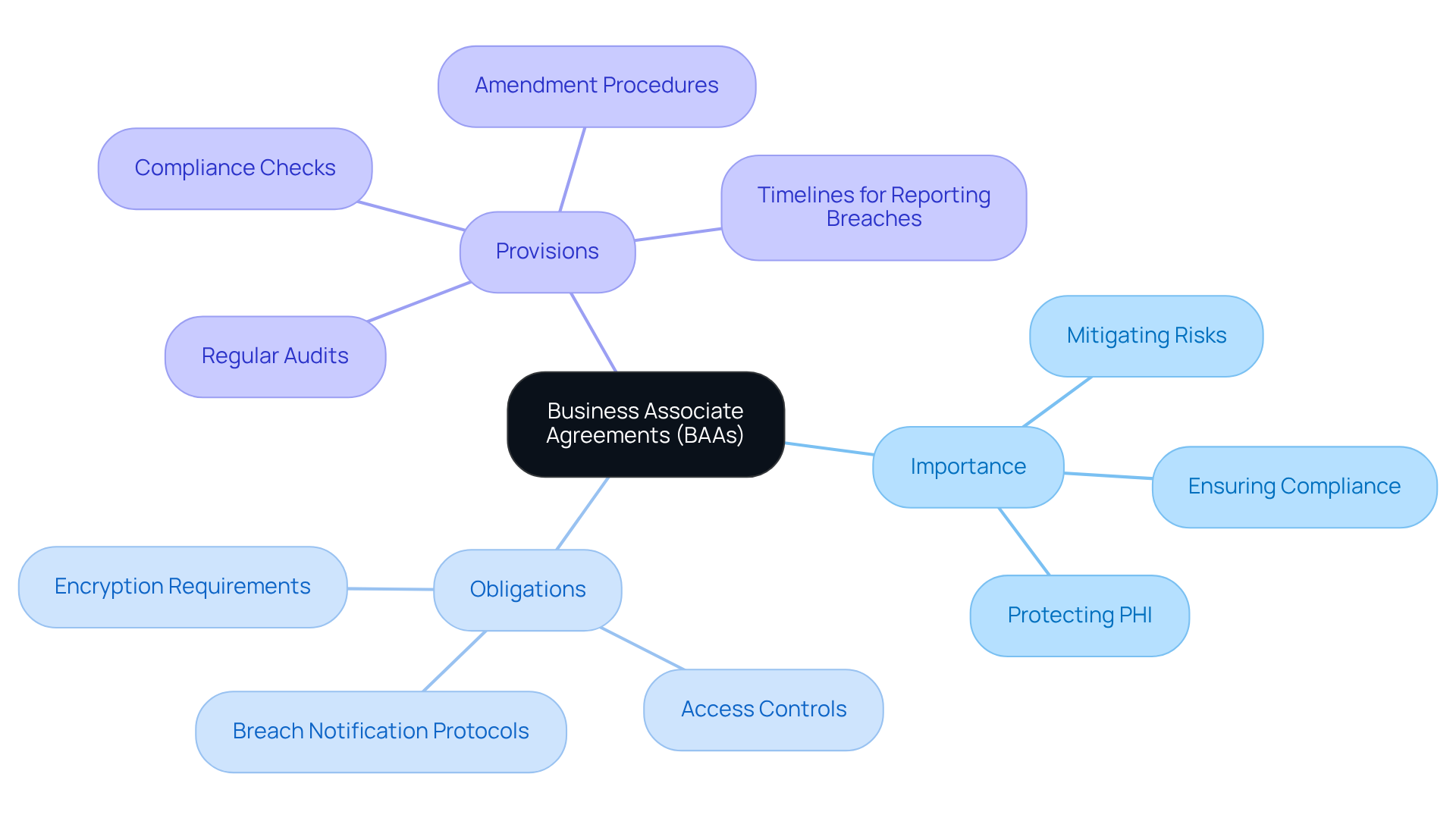
Patient Consent Management: A Key Component of HIPAA Compliance
Consent management from individuals is crucial for ensuring HIPAA compliance, as it mandates explicit permission before collecting or sharing Protected Health Information (PHI). This process not only safeguards individual privacy but also empowers individuals to take control of their health information.
Efficient consent management systems in the medical field utilize a HIPAA compliant chatbot to seamlessly handle consent requests. These systems provide individuals with clear information about how their data will be utilized. For instance, they can facilitate verbal consent in emergency situations, allowing care providers to act in the best interests of the individual while adhering to regulatory requirements.
Compliance specialists emphasize that robust consent management is vital. It mitigates risks associated with unauthorized disclosures and fosters trust between individuals and service providers. By integrating user-friendly consent procedures into healthcare technology, organizations can effectively use a HIPAA compliant chatbot to navigate the complexities of privacy regulations while prioritizing patient rights.
In summary, strong consent management is not just a regulatory requirement; it is a foundational element that enhances patient trust and engagement in their healthcare journey. Organizations must act now to implement these systems, ensuring they meet both compliance standards and the needs of their patients.
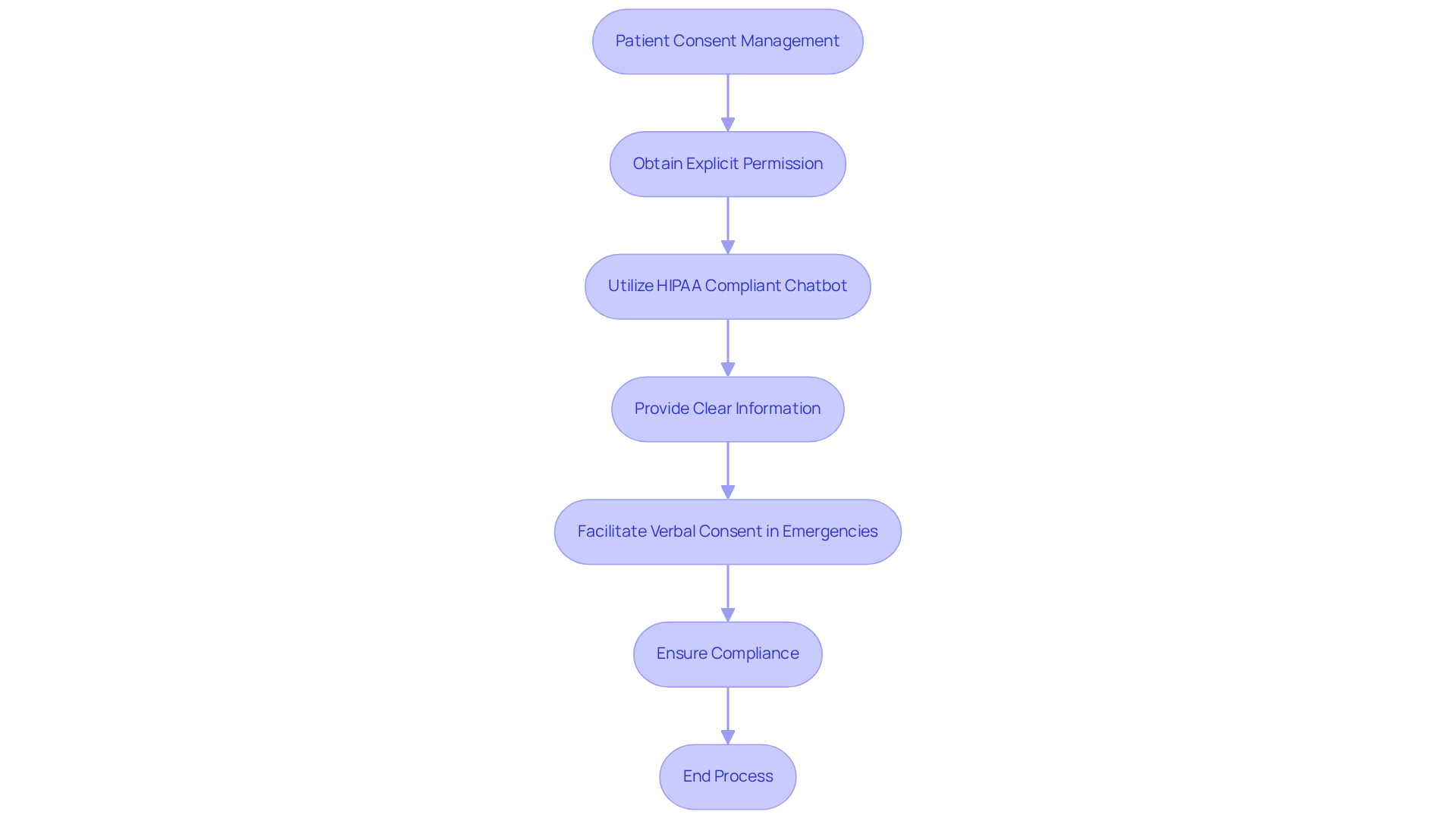
Access Controls: Protecting Sensitive Health Information in Chatbots
Access controls serve as critical mechanisms that restrict access to sensitive health information, tailored specifically to user roles and responsibilities. By implementing role-based access controls, organizations can ensure that only authorized individuals have the ability to view or modify Protected Health Information (PHI). This practice is not merely a recommendation; it is an essential element of health information privacy compliance. It plays a pivotal role in preventing unauthorized access and potential breaches, safeguarding both patient trust and organizational integrity.
Consider the implications: without stringent access controls, sensitive data could fall into the wrong hands, leading to devastating consequences for both individuals and healthcare providers. Statistics show that organizations with robust access controls experience significantly fewer data breaches. This underscores the necessity of adopting such measures as a proactive approach to data security.
In conclusion, role-based access controls are not just a regulatory requirement; they are a fundamental strategy for protecting sensitive health information. Organizations must prioritize these controls to ensure compliance and maintain the trust of their patients.
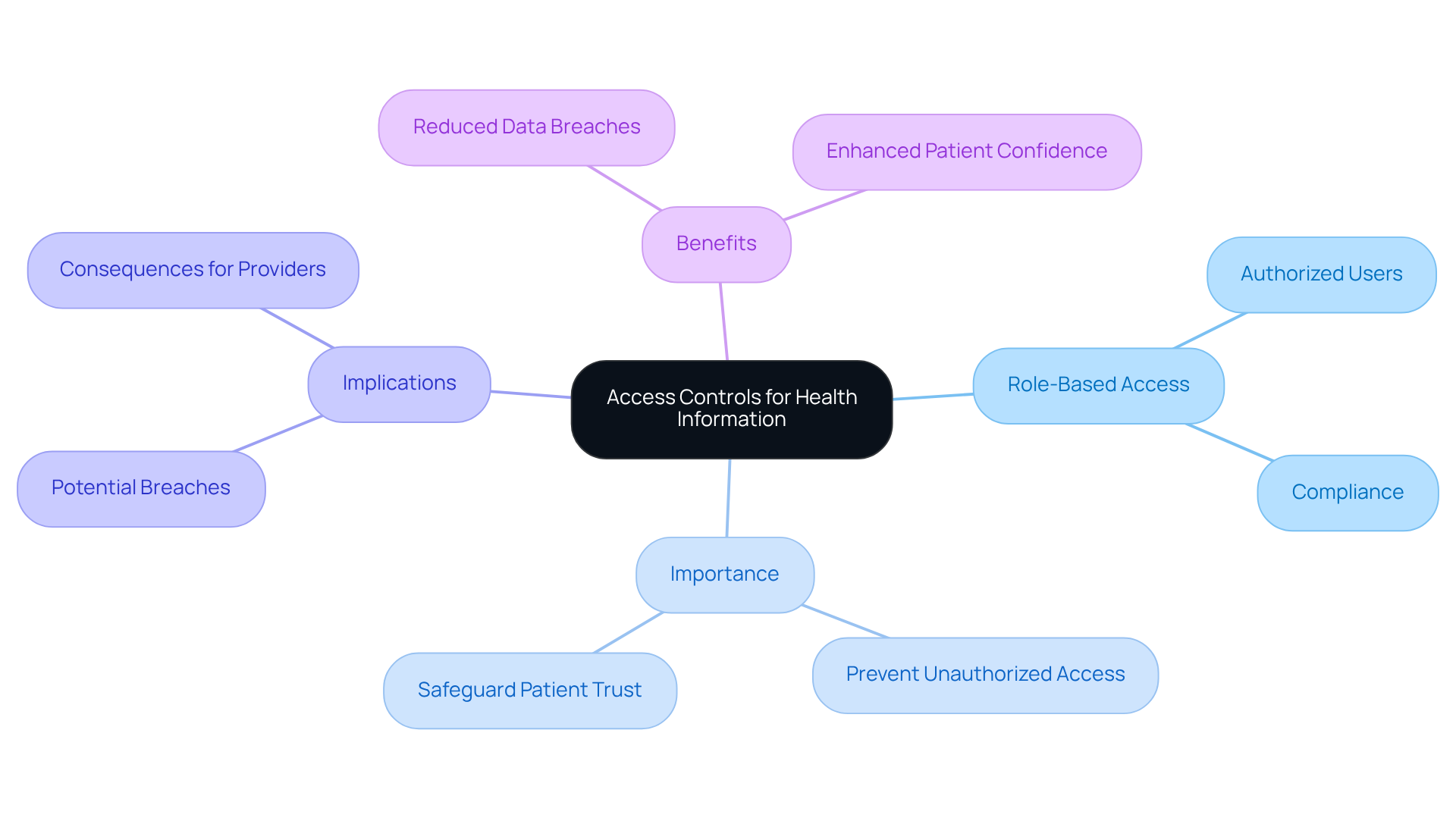
Audit Trails: Ensuring Accountability in HIPAA Compliant Chatbot Operations
Audit trails are essential for monitoring access and modifications to protected health information (PHI) during interactions with a HIPAA compliant chatbot. They create a comprehensive log detailing who accessed specific information and when, ensuring accountability in information management. Regular audits of these trails are crucial for demonstrating compliance with HIPAA regulations, especially in the context of using a HIPAA compliant chatbot. They help identify potential security vulnerabilities and ensure that access controls are functioning effectively.
Organizations that implement robust audit trails can significantly enhance their security posture. This is underscored by the alarming statistic of 491 large-scale breaches reported in U.S. medical services in 2024. By maintaining thorough logs and implementing a HIPAA compliant chatbot, organizations not only comply with regulatory requirements but also foster trust among individuals, who increasingly prioritize the security of their health records.
Compliance auditors stress that effective tracking of PHI access through audit trails is vital for mitigating risks. It ensures that any unauthorized access can be swiftly addressed. This proactive approach to information accountability is not just a regulatory necessity; it is a cornerstone of effective healthcare delivery.
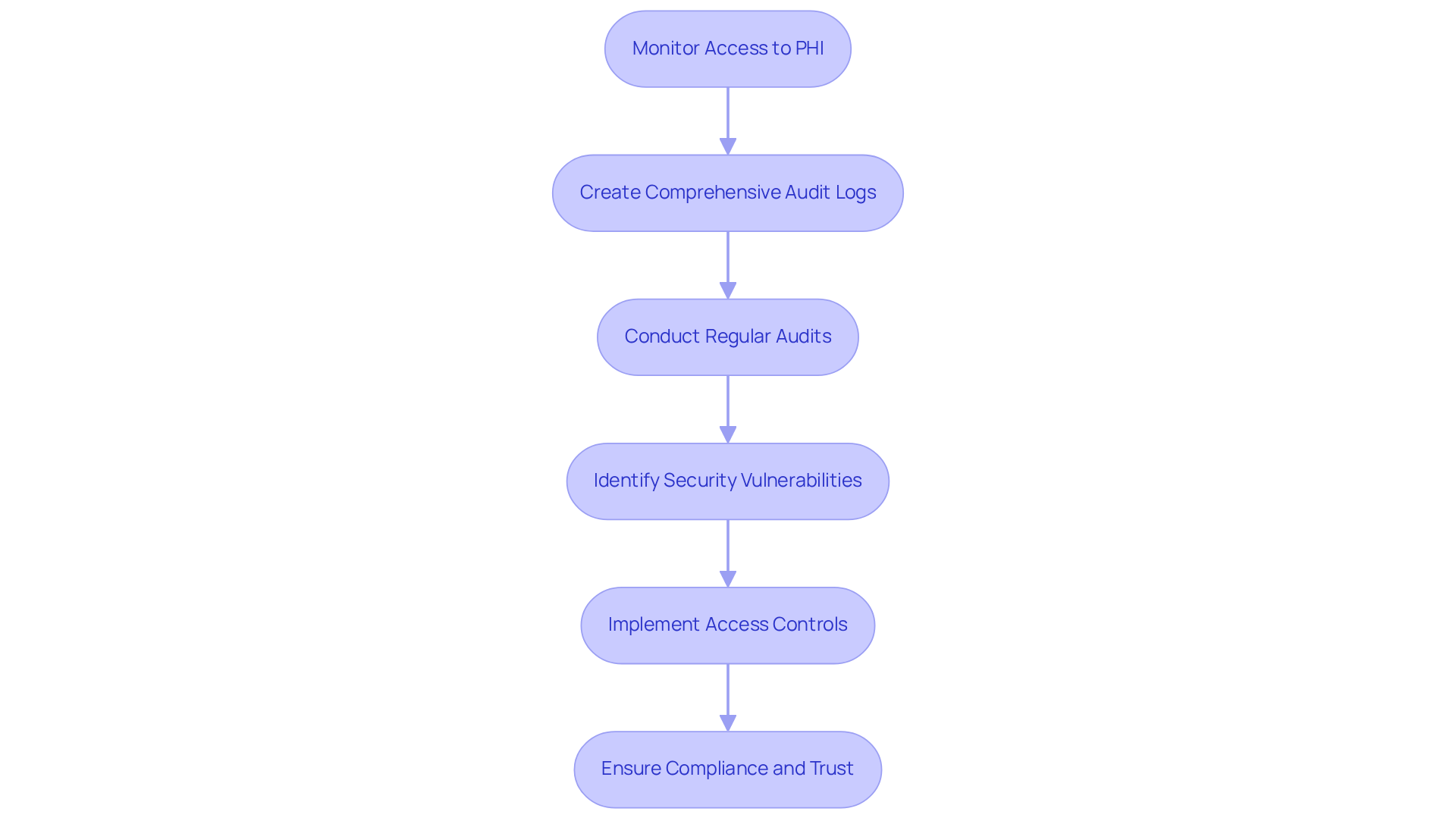
EHR Integration: Streamlining Data Management for HIPAA Compliant Chatbots
Integrating chatbots with Electronic Health Records (EHR) systems is a game-changer in healthcare technology. This integration enables real-time access to individual patient information, significantly enhancing the chatbot's ability to deliver precise and prompt responses. However, it is crucial that this integration of a HIPAA compliant chatbot adheres to stringent healthcare regulations.
Ensuring that patient information is handled securely not only protects privacy but also builds trust in these innovative solutions. By prioritizing compliance, healthcare providers can leverage the full potential of HIPAA compliant chatbots while safeguarding sensitive data.
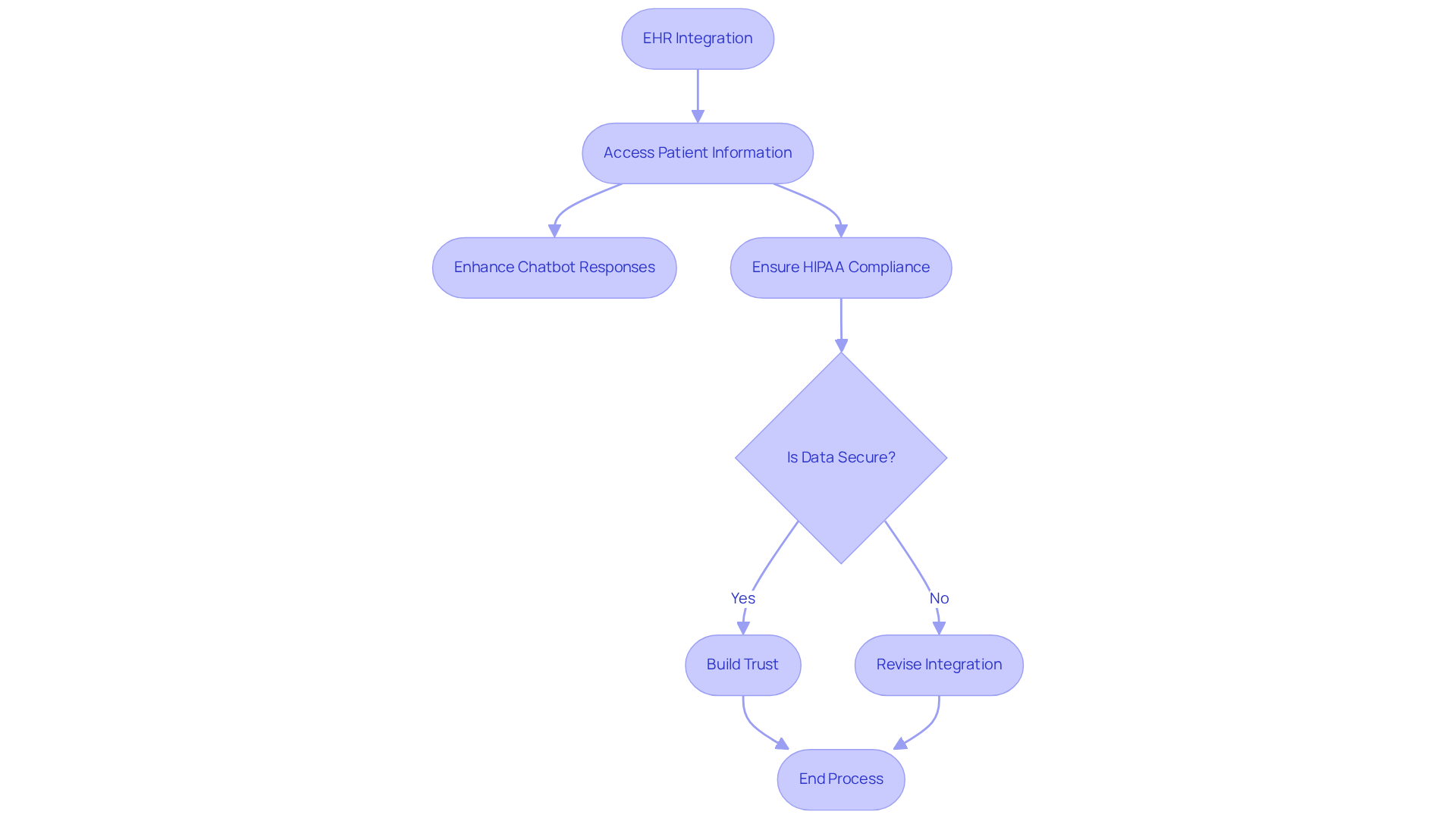
Real-Time Analytics: Monitoring Compliance and Performance in Chatbots
Real-time analytics are essential for effectively overseeing interactions with a HIPAA compliant chatbot and ensuring compliance with healthcare regulations. Intone's AI voice agents offer a powerful analytics dashboard that enables organizations to monitor changes in key metrics within minutes of launching new scripts or voice configurations. By analyzing user interaction data, organizations can identify trends, evaluate performance, and make necessary adjustments to enhance service delivery while adhering to compliance standards. This proactive strategy not only reduces risks associated with HIPAA violations but also builds trust among patients and stakeholders by utilizing a HIPAA compliant chatbot.
Experts in analytics emphasize the significance of leveraging insights to improve chatbot performance. Intone's platform allows organizations to provide feedback on calls, fine-tuning agent behavior in real time. As industry leaders have noted, effective decision-making hinges on the ability to evaluate available information and integrate it with personal judgment. Data analysts echo this sentiment, asserting that grasping the narratives behind the data is vital for driving meaningful enhancements in chatbot interactions.
Organizations can harness real-time analytics to boost the performance of their HIPAA compliant chatbot by establishing a baseline for interactions and continuously evaluating responses against approved standards. Intone's AI voice agents ensure that chatbots function within safe parameters, maintaining a human-like tone and empathy in customer interactions. By implementing structured systems for monitoring AI interactions, organizations can utilize a HIPAA compliant chatbot to turn potential compliance liabilities into competitive advantages, ultimately leading to heightened customer satisfaction and operational efficiency in the healthcare sector.
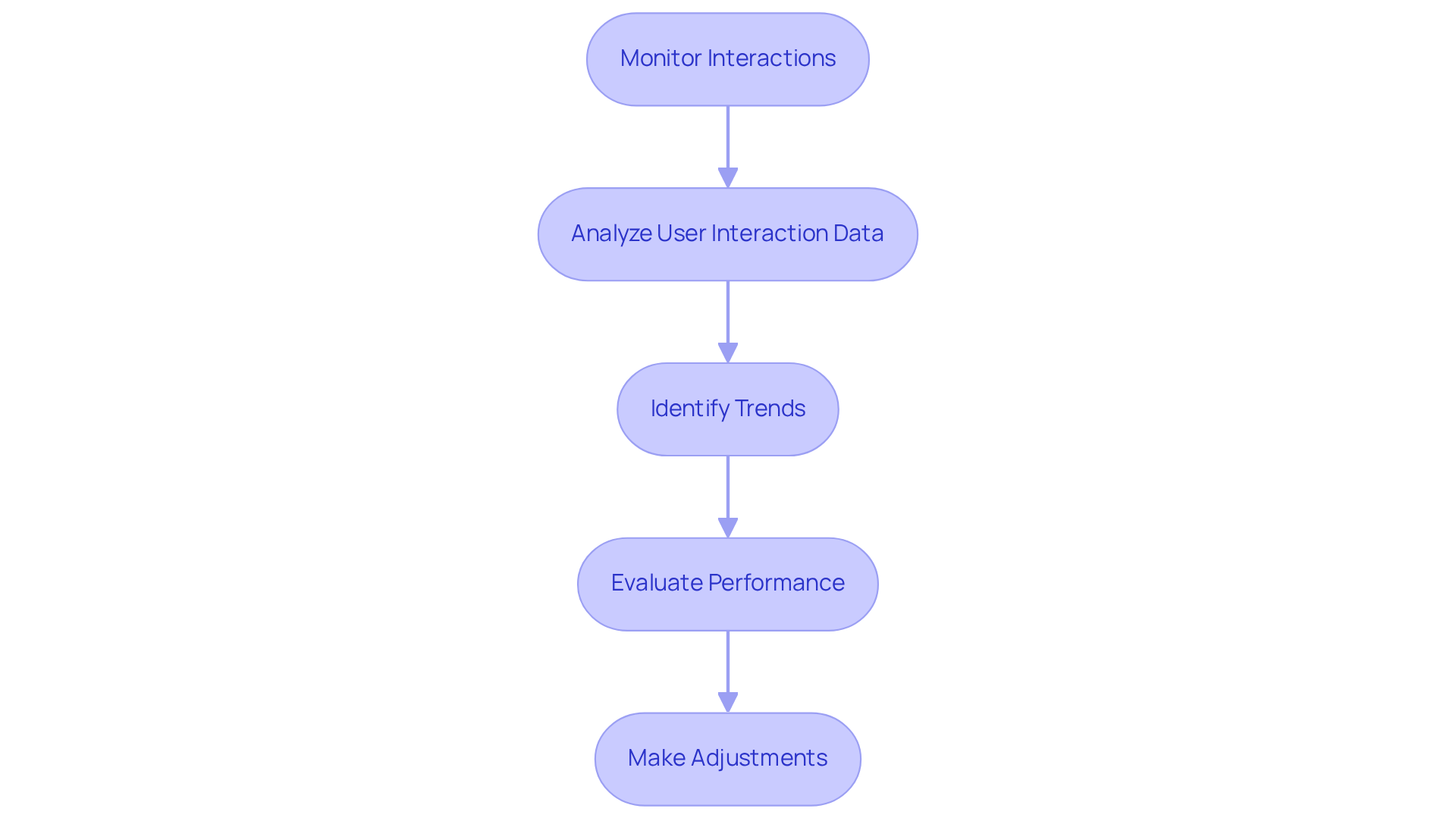
Staff Training: Essential for Maintaining HIPAA Compliance in Chatbot Use
Effective staff training is crucial for ensuring that employees understand healthcare regulations and the proper use of a HIPAA compliant chatbot for managing Protected Health Information (PHI). Regular training sessions must cover essential topics such as:
- Data privacy
- Security protocols
- Incident response strategies
This comprehensive knowledge empowers staff to utilize chatbots effectively while maintaining compliance standards.
Consider this: 74% of personnel in the healthcare field receive privacy training annually, underscoring the importance of continuous education. As Penelope Schweitzer aptly states, "The simplest method to ensure everyone is in agreement is to establish a thorough compliance training program." Furthermore, new staff members are legally required to complete health information privacy training within their first 90 days of employment, emphasizing the necessity of prompt training.
The stakes are high; over 50% of employees handling PHI fail compliance evaluations, making effective training programs indispensable. Alarmingly, 58% of healthcare breaches involve practice employees, highlighting the significant risks associated with inadequate training. By prioritizing training, organizations can ensure their workforce is well-prepared to navigate the complexities of HIPAA compliance while effectively utilizing a HIPAA compliant chatbot.
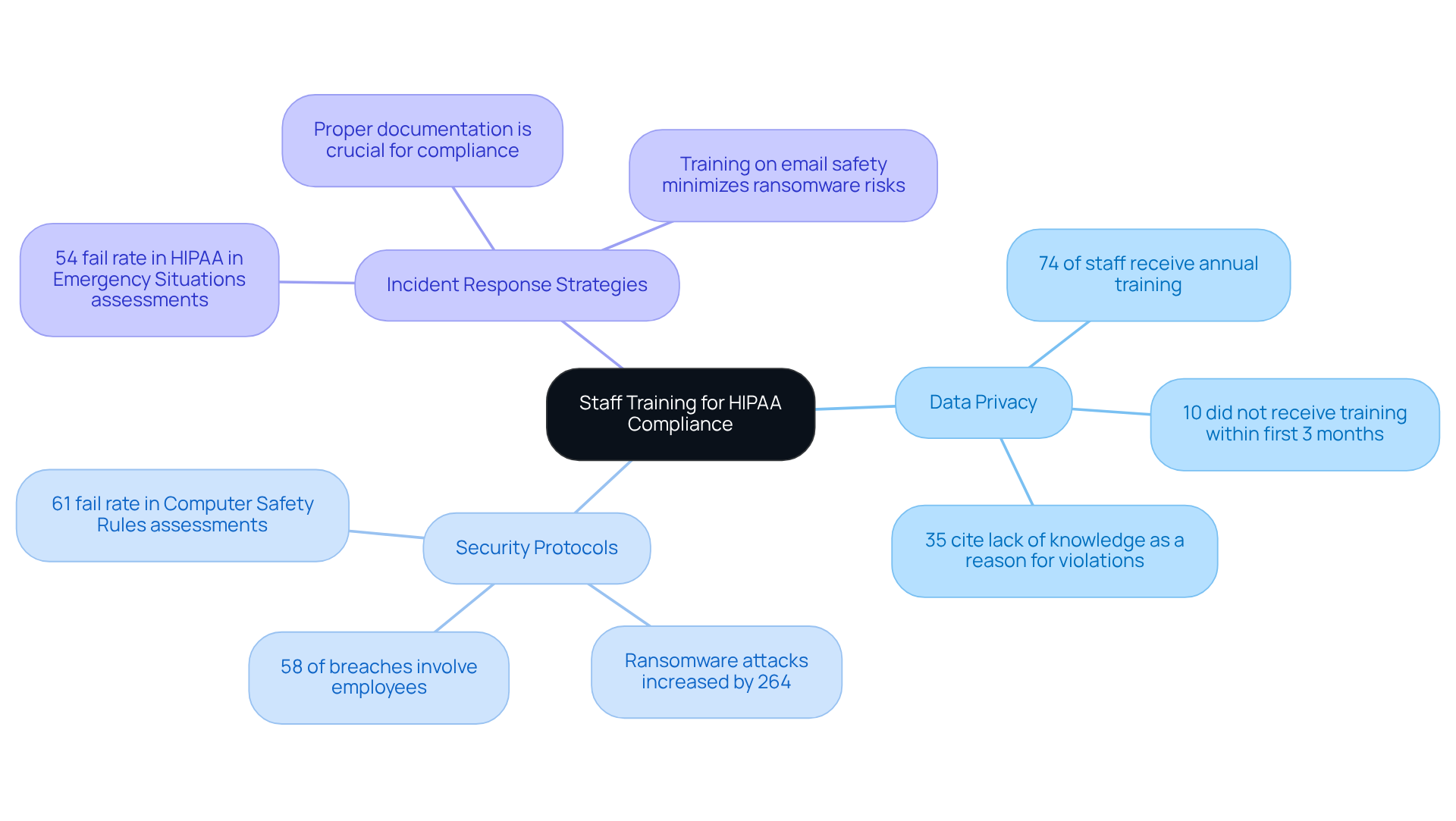
Challenges in Development: Navigating HIPAA Compliance for Chatbots
Creating a HIPAA compliant chatbot presents significant challenges that organizations must address to protect patient data effectively. These challenges include:
- Ensuring information security
- Managing consent
- Integrating with existing systems
To navigate these complexities, organizations need to implement robust security measures. Conducting thorough risk assessments is essential, as it helps identify potential vulnerabilities and ensures that appropriate safeguards are in place. Staying informed about regulatory changes is equally crucial, as the landscape of healthcare compliance is constantly evolving.
Addressing these challenges is not just a regulatory requirement; it is vital for maintaining compliance and safeguarding sensitive patient information. By prioritizing these efforts, organizations can build trust with their patients and enhance their overall operational integrity.
In conclusion, the path to creating a HIPAA compliant chatbot is fraught with challenges, but with the right strategies in place, organizations can successfully navigate this landscape. Taking proactive steps today will ensure compliance and protect patient data for the future.

Conclusion
Creating a HIPAA-compliant chatbot is not just beneficial; it’s essential for modern healthcare operations. This ensures that sensitive patient information is managed with the utmost care and in accordance with regulatory standards. By integrating advanced features such as end-to-end encryption, Business Associate Agreements (BAAs), and effective patient consent management, organizations can foster a secure environment. This not only enhances patient trust but also streamlines communication.
Key aspects to consider include:
- The necessity of robust access controls to protect sensitive health information
- The importance of audit trails for accountability
- The transformative potential of integrating chatbots with Electronic Health Records (EHR) systems
- Real-time analytics
- Comprehensive staff training
These are critical components that empower healthcare providers to maintain compliance and optimize the performance of their chatbot solutions.
As the landscape of healthcare technology evolves, organizations must prioritize implementing these essential features in their chatbot solutions. By doing so, they safeguard patient data and position themselves as leaders in delivering secure, efficient, and compliant healthcare services. Embracing these strategies will ultimately enhance operational integrity and patient satisfaction, paving the way for a more secure and responsive healthcare environment.
Frequently Asked Questions
What is Intone and what services does it provide?
Intone offers 24/7 AI voice agents that handle customer inquiries related to sensitive health information, such as appointment management and basic support, while ensuring HIPAA compliance.
How do Intone's AI voice agents improve customer support in healthcare?
By automating Tier-1 support, Intone enhances communication in the medical field, boosts operational efficiency, and significantly reduces wait times for responses, with some facilities reporting average response times of under 30 seconds.
Why is HIPAA compliance important for AI voice agents in healthcare?
HIPAA compliance is crucial as it ensures the protection of sensitive health information, maintaining privacy and security for both patients and healthcare providers.
What role does end-to-end encryption play in chatbot interactions?
End-to-end encryption secures all information exchanged between individuals and chatbots, ensuring that data remains unreadable to unauthorized parties, thus protecting sensitive details and maintaining HIPAA compliance.
Why is a Business Associate Agreement (BAA) necessary for chatbot solutions?
A BAA is essential as it outlines the responsibilities of chatbot providers in managing Protected Health Information (PHI), ensuring both parties are aligned on information protection measures and compliance with HIPAA regulations.
What key obligations are typically included in a BAA for chatbot providers?
BAAs typically include requirements for encryption, access controls, breach notification protocols, regular audits, and compliance checks to uphold health information privacy standards.
How do BAAs enhance accountability in the event of a data breach?
A well-structured BAA defines the responsibilities of each party, fostering accountability and ensuring that necessary safeguards are in place to protect individual data.
What is the significance of having comprehensive BAAs in healthcare?
Comprehensive BAAs are vital for protecting individual privacy and ensuring that HIPAA compliant chatbot solutions maintain regulatory compliance, especially given that many healthcare organizations have experienced breaches involving business associates.






